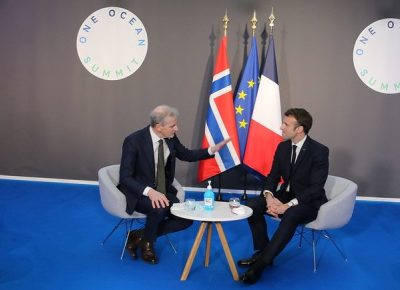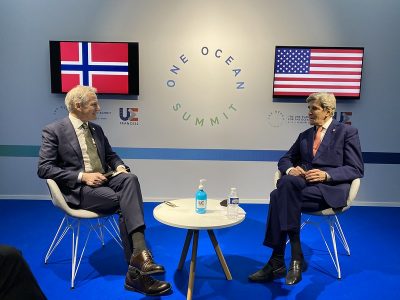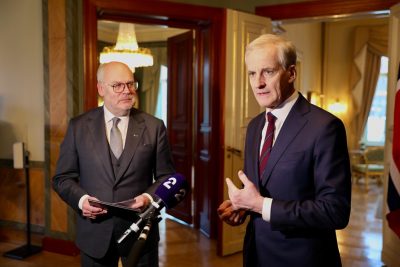It’s not often that Norway’s foreign minister suddenly holds a press conference on a Friday evening, or that the prime minister sits down for a meeting with the president of France. Both occurred within hours of each other, however, as fears of a Russian invasion of Ukraine escalated and NATO troops were once again reinforced.

Foreign Minister Anniken Huitfeldt found it necessary to stress how “serious and unpredictable” the security situation in Ukraine has become, after Russian troops have all but surrounded the country. She urged any Norwegians still in Ukraine to leave as quickly as possible, like several other countries including the US and the Netherlands have done earlier.
“It’s a serious and unpredictable situation that can change quickly,” Huitfeldt told reporters, before advising against all travel to Ukraine and urging Norwegians there to leave. The foreign ministry also advised against all travel to or presence in Russia within 250 kilometers of the Ukrainian border.
Norway, both a member of NATO and a neighour of Russia in the far north, has kept its embassy in Kiev open but Huitfeldt said it was unclear whether they’d continue to be able to help any Norwegian citizens in distress. “It’s still possible to leave the country with regularly scheduled airlines or other transport,” Huitfeldt said at her press conference. “We advise Norwegian citizens to make use of that possibility.”
Prime Minister Støre, meanwhile, was in France on Friday to attend the One Ocean summit intended to urge conservation of oceans around the world. Støre also had one-on-one meetings with both French President Emmanuel Macron and the former US Secretary of State John Kerry, now the US special envoy on climate issues. Russia’s threatening presence around Ukraine was on the agenda.
Støre told Norwegian reporters afterwards that Macron, who just returned from a lengthy meeting with Russian President Vladimir Putin in Moscow and with Ukraine’s leader in Kiev, was interested in how Norway has dealt with Russia as a neighbour. Norway and Russia have managed to maintain friendly relations in their shared Arctic areas, while remaining rivals through NATO.

Støre could tell Macron how Norway and Russia succeeded in agreeing on their border in the Barents Sea and on other matters from fishing quotas to search and rescue cooperation. Norway’s negotiations with Russia on their border at sea when he served as Norway’s foreign minister “is an important story” Støre told NRK, and a result of “learning to live alongside Russia.” Norwegians living in Norway’s northernmost region of Finnmark that borders to Russia also remain grateful for how Soviet troops marched over the border in 1944 and pushed Norway’s Nazi German occupiers out of the area, liberating Finnmark and then retreating again. Støre and other Norwegian government officials haven’t forgotten that, either.
“Now there’s a military buildup around Ukraine with major military exercises underway and a lack of good, diplomatic conversations,” Støre told NRK on Friday, “but Macron is an active contributor to political dialogue, and that negotiations should get underway. A military solution is dangerous and not wanted under any circumstances.” On Friday night came news that Macron would have another meeting with Putin on Sunday.
Huitfeldt, meanwhile, based her warnings to leave Ukraine and Russia on Russia’s recent major expansion of troops all along its border to Ukraine and within Belarus. Admiral Nils Andreas Stensønes, who leads Norway’s military intelligence agency E-tjenesten, told Norwegian Broadcasting (NRK) earlier on Friday that Russia now appears poised for a full invasion of Ukraine in order to control what Putin wants as a “sphere of influence” along its own border. Putin has felt increasingly threatened over the years by NATO’s expansion, and has unsuccessfully demanded that Ukraine never join NATO like other former eastern bloc countries have.
“Russia is displaying a willingness to use force to maintain its interests,” Stensønes told NRK, adding that Europe hasn’t seen such threats of force since the end of the Cold War. Stensønes, a career military officer, said an invasion would lead to “major human losses on both sides.” He doesn’t think Russia wants to spread the conflict, thought, and therefore sees no immediate direct consequences for Norway or other Russian neighbours that are members of NATO.
Few countries are as concerned about the Russia-Ukraine conflict as those in the Baltic, and Estonian President Alar Karis was in Norway last week to visit a NATO ally and have talks with Støre. Estonia was formerly part of Russia and alternately subjected to Swedish, Polish and Danish influence as well. The small country declared its independence after the Russian revolution, only to be annexed again by the Soviet Union in 1940, occupied by Nazi Germany in 1941 and reoccupied by the Soviet Union in 1944. Estonia finally regained its independence after the Soviet Union fell apart in 1991 and joined NATO along with neighbouring Latvia and Lithuania in 2004.

“So we know what it means when other countries jump in and make the rules,” Karis told newspaper Aftenposten. Estonia has only been independent again for the past 30 years and has recently urged more NATO presence, as have Latvia and Lithuania.
They’ve received it, with Norwegian troops joining NATO forces in the Baltic. Twenty-year-old Emil Gustafson was among them late last month, telling news bureau before leaving Oslo that “Mama is a bit nervous, and following the situation closely, but I’ve tried to calm her down and said that everything will go fine with us.” He and 150 other Norwegian soldiers will be in Lithuania for the next six months, patrolling an area not far from the border to Belarus.
Returning to the way the world was before the Soviet collapse is not acceptable, according to Karis, and he doesn’t think NATO’s presence increases tensions. Rather, he said, “it can have a certain effect on Russia.”
Others disagree, with Professor John Mearsheimer at the University of Chicago, calling NATO’s expansion “idiotic.” He told Oslo newspaper Klassekampen last week that the US’ “steady pressure to make Ukraine part of the west and include the country in NATO” has led to the crisis today. Still others maintain that the US and NATO gave Russian leaders even before Putin reason to believe there would be no NATO expansion after the Berlin Wall fell. Frustrations grew when that didn’t happen, and have reached the boiling point now.
newsinenglish.no/Nina Berglund

